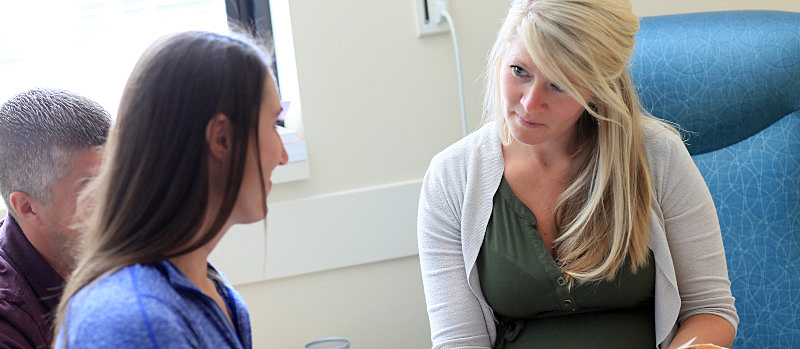Finding out that you are expecting is usually a time of celebration and anticipation. But when you learn that your baby has a complex fetal diagnosis, that experience changes quickly. You may be feeling scared, angry or frustrated. You will naturally have a lot of questions and will need to prepare differently than how you originally expected.
As a social worker who works with the Cincinnati Fetal Center, here are a few things I recommend parents do to begin mentally and logistically preparing for a baby with a complex fetal diagnosis:
Mentally & Logistically Preparing for a Baby with a Complex Fetal Diagnosis
1. Understanding your coping style
Understanding how you cope with difficult situations will help you recognize how to move through your pregnancy. Do you prefer to keep information private? Do you need the support of your closest friends? Your partner may cope differently, and that’s totally normal.
2. Educating yourself
You likely have a lot of questions. Getting answers can help you feel more in control of the situation, help you plan for the future, and help you make decisions. While there is an abundance of information out there, it is important to remember that your baby’s situation is unique. You may be able to find general information on the internet, but the most helpful and accurate information will come from your medical team.
3. Sharing information about your pregnancy
I recommend thinking about how much information you want to share and with whom you want to share it. It’s important to make sure that you and your partner are in agreement about this. Do you want to share everything face-to-face? Designate a spokesperson? Some families utilize Facebook or private online platforms such as CaringBridge.
4. Preparing general responses
You are likely to get asked many questions as you embark upon this journey. Families have found it helpful to prepare some general responses ahead of time. For those who will be more supportive and understanding, you may want to be more open with your responses. However, with others, you may want to have a more generic response prepared to acknowledge their questions and concerns, but prevent further questions. Some examples include:
- “The future is unknown right now, but please keep us in your prayers.”
- There is much we don’t know, but we’re hoping for the best.”
- My baby isn’t healthy, but we are working with our doctors and hoping for the best.”
5. Building a support system
Having a support system of helpful family members, enthusiastic friends and supportive co-workers can make your pregnancy run a lot smoother. While couples lean on each other during this time, it is just as important for each of you to have people outside of your immediate family to talk to and reach out to for help. They may be able to help you with logistical needs, such as transportation and childcare, as well as things like managing communications.
6. Explaining how to help
Once you have the right people in place, you’ll have to give them a little guidance on how to best support you. It may be emotional support, such as a shoulder to cry on, or needing their help keeping a positive outlook. Our families have used support from neighbors to help with childcare, ride shares or meal assistance. Churches have taken up collections to help with medical or relocation expenses. Family members and coworkers have been helpful with dispersing information to others.
7. Finding the good
Even though you are coping with unforeseen challenges, or potentially facing a heartbreaking loss, it may be helpful to remember that the life inside of you is already a part of your family. Find ways to honor him or her by making memories. Start using his or her name and encourage others to do so as well. Take advantage of perinatal hospice programs like StarShine or Footprints to assist you with birth planning and memory making throughout your pregnancy.
8. Setting up the right resources
I recommend taking advantage of all of the support services your fetal center has to offer. That may include social work, chaplains, hospice, child life specialists, nurses and more. Your social worker will be able to help you navigate your insurance, financial resources, and lodging, transportation and relocation logistics. For online resources, I suggest looking at benotafraid, healingfromthestart, and alightershadeofblue.





